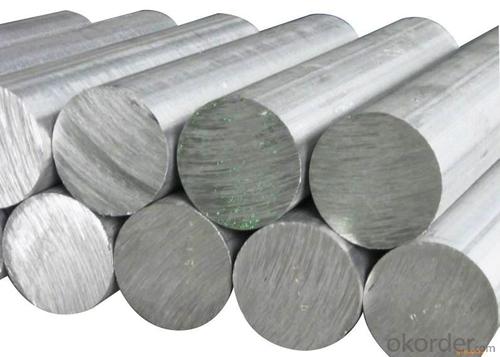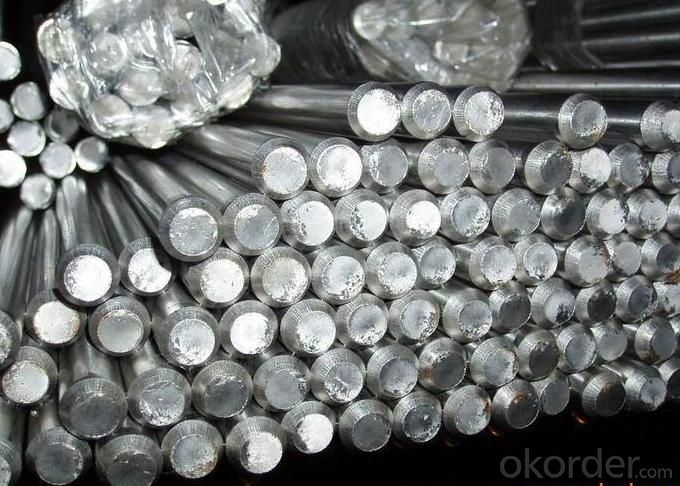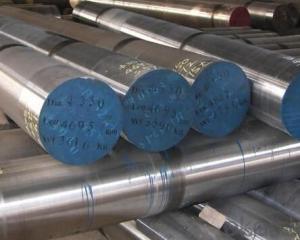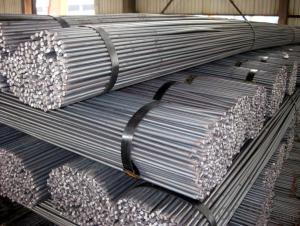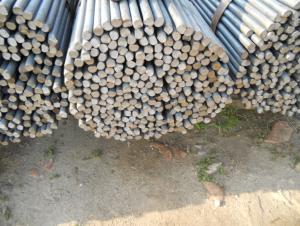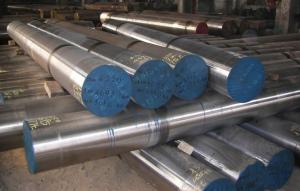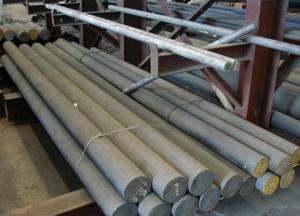Bearing Steel Round Bar
- Loading Port:
- Guangzhou
- Payment Terms:
- TT or LC
- Min Order Qty:
- 25MT m.t.
- Supply Capability:
- 80000 Tons/Year m.t./month
OKorder Service Pledge
OKorder Financial Service
You Might Also Like
Specifications of Bearing Steel Round Bar
|
Grade |
AISI 52100, ASTM E52100, DIN 1.3505,JIS SUJ2, GCr15 |
|
Dimensions |
Diameter: 30-60mm Length: 2000-13000mm or as required |
|
Shape |
Round Bar |
|
Type |
Alloy Steel Bar |
|
Delivery Condition |
Black Surface |
|
Material |
Bearing Steel |
|
Technique |
Hot Rolled |
Usage and Applications of Bearing Steel Round Bar
Bearing steels are used for ball and roller bearing applications and are comprised of low carbon steels and high carbon through harden able steel.
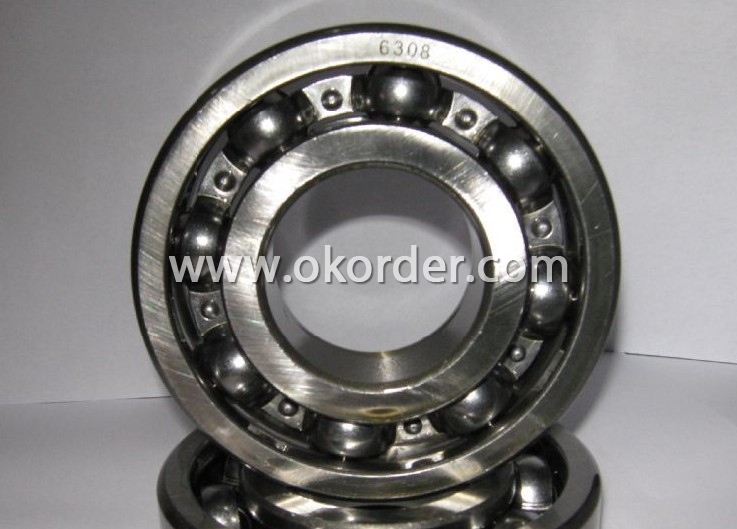
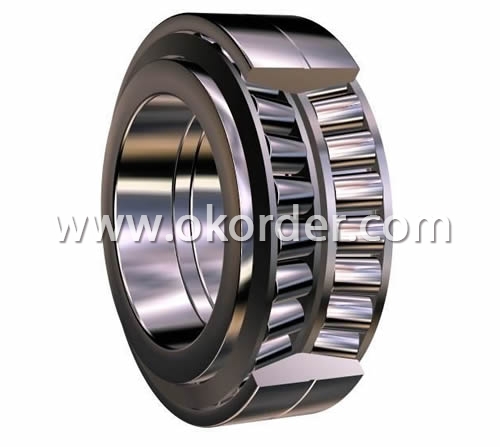
First the famous 1C-1.5Cr steel from which the majority of bearings are made. Its structure is apparently well-understood and the focus is on purity in order to avoid inclusions which initiate fatigue during rolling contact. Then there is the M50 steel and its variants, from which bearings which serve at slightly higher temperatures in aeroengines are manufactured, based on secondary-hardened martensite.
Tapered roller bearing are generally used to support combined load mainly consisting of radial load. Their cups are separable for easy assembling ,During mounting and using, radial clearance and axial clearance can be adjusted and preloaded mounting can be made.
Packaging & Delivery of Bearing Steel Round Bar
Packaging Detail: ASTM 52100 Steel in seaworthy packing or on customer request; Packed in bundles with standard export sea-worthy package or as customer require
Delivery Detail: 45 days after confirmed
Trade terms: FOB, CFR, CIF ou as customer's required
MOQ: 25 tons or at customer's demands. If the quantity is good, the price will be better.
Processing of Bearing Steel Round Bar
The processing of Bearing Steel Round Bar is hot rolled (strictly control sulphur, phosphorus and non-metallic inclusions content and distribution)
Chemical Composition of Bearing Steel Round Bar
|
C |
Si |
Mn |
Cr |
Ni |
Cu |
|
Equal or less than | |||||
|
0.95-1.05 |
0.15-0.35 |
0.25-0.45 |
Cr:1.40-1.65 |
0.30 |
0.25 |
All products' chemical composition and specification can be design according to customers' requirement.
Note of Bearing Steel Round Bar
1. According to national standard (GB) for our products, if not, supply according to national standards (GB) or agreement.
2. We can not only provide electric furnace +LF+VD and electros lag re-melting (ESR) steel forging materials, but also forging products of piece, bar, etc.
3. Our company is equipped with roll equipment and can provide our customers with roll billets or finished.
4. Please send us your detailed specifications when inquire. We will reply to you ASAP.
5. Certificate of quality is issued in English, in addition the normal terms, production process, the mechanical property (yield strength, tensile strength, elongation and hardness. forged ratio, UT test result, Grain size, heat treatment methods and the sample of is shown on the certificate of quality.
- Q: What are the common challenges in machining titanium alloys?
- The common challenges in machining titanium alloys include their high chemical reactivity, low thermal conductivity, high cutting forces, and poor chip control. Additionally, titanium alloys tend to work harden, making them prone to tool wear and requiring frequent tool changes. Moreover, their low modulus of elasticity can lead to vibration and chatter during machining operations, affecting surface quality and dimensional accuracy.
- Q: What are the main advantages of using special steel in the medical field?
- The main advantages of using special steel in the medical field include its high strength and durability, excellent corrosion resistance, biocompatibility, and ease of sterilization. These properties make special steel ideal for manufacturing surgical instruments, implants, and medical devices that need to withstand rigorous use, maintain their shape and performance over time, and ensure patient safety and comfort.
- Q: How does special steel contribute to the power generation aftermarket industry?
- Special steel plays a crucial role in the power generation aftermarket industry by providing high-quality and durable materials that are essential for the construction and maintenance of power generation equipment. Special steels, such as stainless steel and alloy steel, possess unique characteristics that make them well-suited for the demanding conditions and requirements of the power generation sector. One of the key contributions of special steel to the power generation aftermarket industry is its exceptional resistance to corrosion and oxidation. Power generation equipment, such as gas turbines and steam generators, operate in harsh environments where they are subjected to extreme temperatures, pressure, and exposure to various chemical elements. Special steel's corrosion resistance ensures that the equipment can withstand these challenging conditions, thereby minimizing the risk of failure and extending the lifespan of the equipment. Additionally, special steel offers excellent strength and toughness, allowing power generation equipment to withstand high mechanical stress and fatigue. The power generation industry relies on turbines, boilers, and other heavy machinery that are subjected to continuous operation and significant loads. Special steel's high strength and durability enable these components to endure the demanding conditions and effectively handle the power generation process, ensuring safe and reliable operation. Another significant contribution of special steel to the power generation aftermarket industry is its ability to maintain dimensional stability under extreme temperatures. Power generation equipment often operates at high temperatures, and special steel's thermal stability prevents distortion and deformation, ensuring that the equipment retains its shape and functionality over time. Moreover, special steel's versatility allows for the production of various components and parts, customized to meet the specific requirements of power generation equipment. Whether it is turbine blades, boiler tubes, or heat exchangers, special steel can be tailored to provide the desired mechanical properties, corrosion resistance, and thermal stability needed for each application. In summary, special steel is an indispensable material in the power generation aftermarket industry. Its corrosion resistance, strength, toughness, thermal stability, and versatility make it an ideal choice for constructing and maintaining power generation equipment. By providing reliable and durable materials, special steel contributes to the efficiency, safety, and longevity of power generation systems, ensuring the continuous supply of electricity to meet the growing demands of our modern world.
- Q: What are the different heat treatment furnaces used for special steel?
- Different heat treatment furnaces used for special steel include annealing furnaces, tempering furnaces, hardening furnaces, and quenching furnaces.
- Q: How does special steel contribute to the power generation equipment industry?
- Special steel plays a crucial role in the power generation equipment industry by offering enhanced performance, durability, and reliability. Power generation equipment, such as turbines, generators, and transformers, operate under severe conditions including high temperatures, pressure, and corrosive environments. Special steel, with its unique properties and characteristics, addresses these challenges and contributes significantly to the industry. One of the key advantages of special steel in power generation equipment is its ability to withstand high temperatures. Special steel alloys, such as heat-resistant steels, are designed to perform under extreme conditions, enabling power plants to operate at elevated temperatures without compromising efficiency or safety. These steels maintain their strength, structural integrity, and resistance to creep and fatigue even at the highest operating temperatures, ensuring the reliability and longevity of the equipment. Furthermore, special steel offers excellent corrosion resistance, which is essential in power generation equipment due to the presence of corrosive substances like water, steam, and chemicals. Stainless steel, for instance, is widely used in power plants for its exceptional resistance to corrosion, preventing equipment degradation and minimizing maintenance costs. By using special steel, power generation companies can reduce downtime and enhance overall efficiency. Special steel also contributes to the power generation equipment industry by providing exceptional strength and mechanical properties. This is particularly important for large-scale equipment such as turbines and generators, which are subjected to high mechanical loads. High-strength special steel allows these components to withstand the stress and pressure, ensuring their safe and reliable operation over an extended period. Moreover, special steel's unique properties, such as high hardness and wear resistance, make it suitable for critical components like blades and rotors, reducing the risk of failure and enhancing overall performance. In summary, special steel is an indispensable material in the power generation equipment industry. Its ability to withstand high temperatures, resist corrosion, and provide exceptional strength and mechanical properties ensures the reliability, durability, and efficiency of power plants. By utilizing special steel, power generation companies can enhance their equipment's performance and reduce maintenance costs, ultimately contributing to the sustainable and reliable production of electricity.
- Q: How does special steel contribute to sustainable construction?
- Special steel contributes to sustainable construction in several ways. Firstly, it has a significantly longer lifespan compared to other construction materials, reducing the need for frequent repairs or replacements. This leads to reduced resource consumption and waste generation. Additionally, special steel is highly durable and resistant to corrosion, making it an ideal choice for structures in harsh environments, such as bridges or offshore wind farms. This longevity and resilience reduce the environmental impact associated with the maintenance and replacement of infrastructure. Furthermore, special steel can be recycled and reused multiple times without losing its properties, reducing the demand for virgin materials and minimizing the carbon footprint of construction projects. Overall, the use of special steel in construction helps promote sustainability by increasing the lifespan of structures, reducing resource consumption, and minimizing waste generation.
- Q: Can special steel be used in the chemical industry?
- Yes, special steel can be used in the chemical industry. Special steel, such as stainless steel or corrosion-resistant alloys, has high resistance to corrosion, heat, and chemical reactions, making it suitable for various applications in the chemical industry. It is commonly used in equipment like reactors, tanks, pipes, and valves to handle corrosive chemicals and maintain product integrity and safety.
- Q: How does special steel perform in high-temperature corrosion resistance?
- Special steel typically performs well in high-temperature corrosion resistance due to its unique composition and properties. It is specifically designed to withstand the harsh conditions of high temperatures and corrosive environments. The alloying elements in special steel, such as chromium, nickel, and molybdenum, enhance its resistance to corrosion and oxidation at elevated temperatures. Additionally, the steel's microstructure and heat treatment play a crucial role in improving its high-temperature corrosion resistance. Overall, special steel exhibits excellent performance in protecting against corrosion and maintaining its structural integrity in high-temperature environments.
- Q: Can special steel be used in the production of consumer goods?
- Consumer goods can make use of special steel in their production. This type of steel is made up of alloys that have been specifically designed to possess distinct characteristics, such as exceptional strength, resistance to corrosion, or heat endurance. These traits enable special steel to be well-suited for a wide array of consumer goods that require longevity, robustness, or protection against wear and tear. One example of the utilization of special steel is in the manufacturing of kitchen appliances, like knives and cookware, where durability and resistance to corrosion are crucial. Additionally, consumer electronics, such as smartphones and laptops, can incorporate this steel in their casing or internal components to ensure structural integrity and safeguarding. Moreover, the automotive industry frequently relies on special steel for the creation of various consumer goods, including bicycles, motorcycles, and cars. The steel's combination of high strength and lightness makes it an ideal choice for constructing sturdy and enduring vehicle frames, engine parts, and other components. To summarize, the application of special steel in the production of consumer goods is indeed feasible due to its unique properties, which make it suitable for situations necessitating strength, durability, and protection against corrosion or wear.
- Q: What industries commonly use special steel?
- Special steel, known as alloy steel as well, finds extensive use in diverse industries owing to its exceptional properties and performance characteristics. Several industries frequently employ special steel, including: 1. Automotive Industry: Special steel is extensively utilized in manufacturing automobile components such as crankshafts, camshafts, gears, and axles. Its exceptional strength, durability, and excellent heat resistance make it suitable for enduring the demanding conditions of the automotive sector. 2. Aerospace Industry: The aerospace industry relies on special steel to manufacture critical components like turbine blades, landing gear, and structural parts. Its ability to withstand high temperatures and maintain structural integrity under extreme conditions is vital for aerospace applications. 3. Oil and Gas Industry: In the oil and gas sector, special steel is crucial for applications like drill bits, valves, pipelines, and offshore platform components. Its corrosion resistance, high strength, and ability to withstand extreme temperatures and pressures make it suitable for these challenging environments. 4. Construction Industry: Special steel serves the construction industry in fabricating structural components, reinforcement bars, and high-rise building frameworks. Its high tensile strength, toughness, and resistance to wear and tear ensure the safety and stability of the structures. 5. Tool and Die Industry: The tool and die sector widely employs special steel in manufacturing cutting tools, molds, dies, and various machine components. Its capability to retain sharpness, resist deformation, and withstand high pressures and temperatures make it indispensable for these applications. 6. Energy Industry: Power generation plants, including nuclear, thermal, and renewable energy facilities, extensively utilize special steel. It is employed in manufacturing turbines, boilers, heat exchangers, and other critical components, thanks to its high temperature and corrosion resistance properties. 7. Medical Industry: In the medical field, special steel plays a crucial role, particularly in surgical instruments and implants. Its biocompatibility, strength, and corrosion resistance make it suitable for applications like joint replacements, dental instruments, and surgical cutting tools. 8. Manufacturing Industry: Various manufacturing processes like machining, forging, and casting widely rely on special steel. It is employed in the production of machine tools, industrial equipment, and heavy machinery components due to its high strength, toughness, and versatility. These examples represent just a fraction of the industries that commonly employ special steel. Its unique properties make it an indispensable material for a wide range of applications where strength, durability, heat resistance, and corrosion resistance are critical factors.
1. Manufacturer Overview
| Location | Guangdong, China |
| Year Established | 2005 |
| Annual Output Value | Above US$ 100 Million |
| Main Markets | korea, India, Malaysia, Brazil, Germany, Belgium, Middle East |
| Company Certifications |
2. Manufacturer Certificates
| a) Certification Name | |
| Range | |
| Reference | |
| Validity Period |
3. Manufacturer Capability
| a) Trade Capacity | |
| Nearest Port | Guangzhou |
| Export Percentage | 50%-80% |
| No.of Employees in Trade Department | 21-100 People |
| Language Spoken: | English; Chinese |
| b) Factory Information | |
| Factory Size: | 23,000 square meters |
| No. of Production Lines | 1 |
| Contract Manufacturing | OEM servise offered |
| Product Price Range | high; average |
Send your message to us
Bearing Steel Round Bar
- Loading Port:
- Guangzhou
- Payment Terms:
- TT or LC
- Min Order Qty:
- 25MT m.t.
- Supply Capability:
- 80000 Tons/Year m.t./month
OKorder Service Pledge
OKorder Financial Service
Similar products
Hot products
Hot Searches
Related keywords





